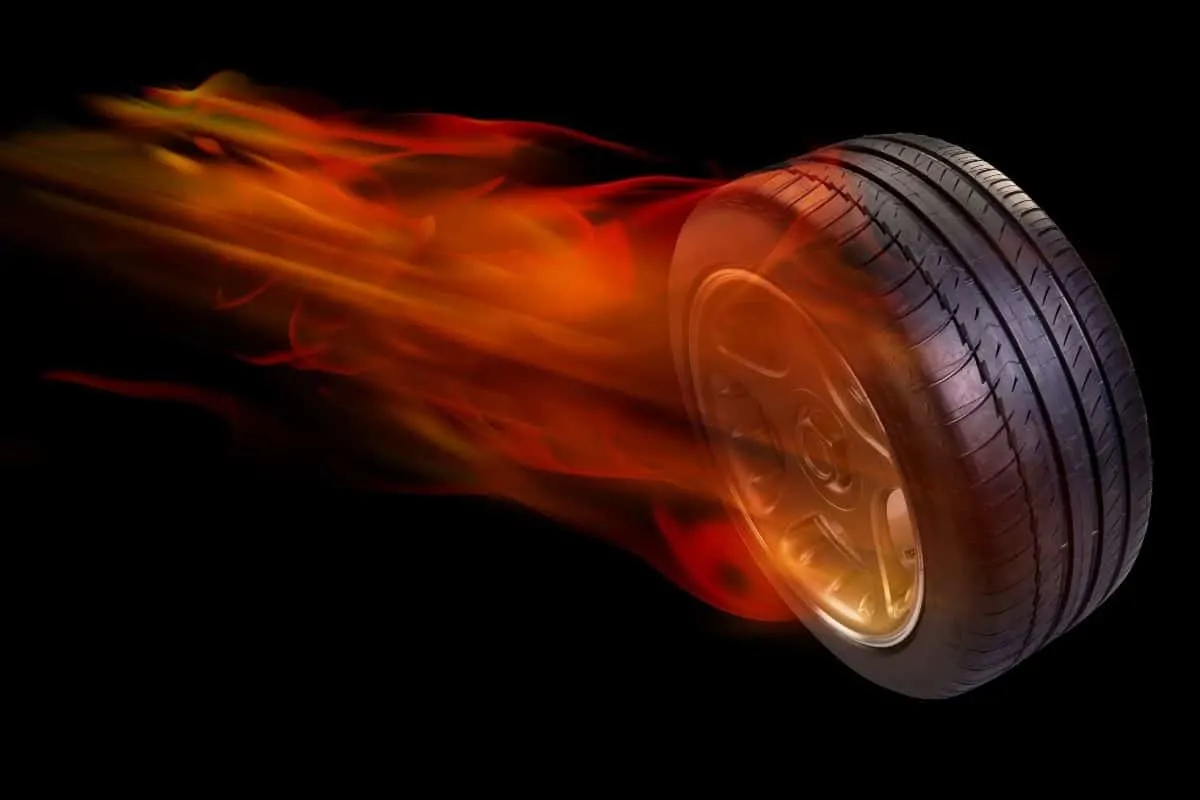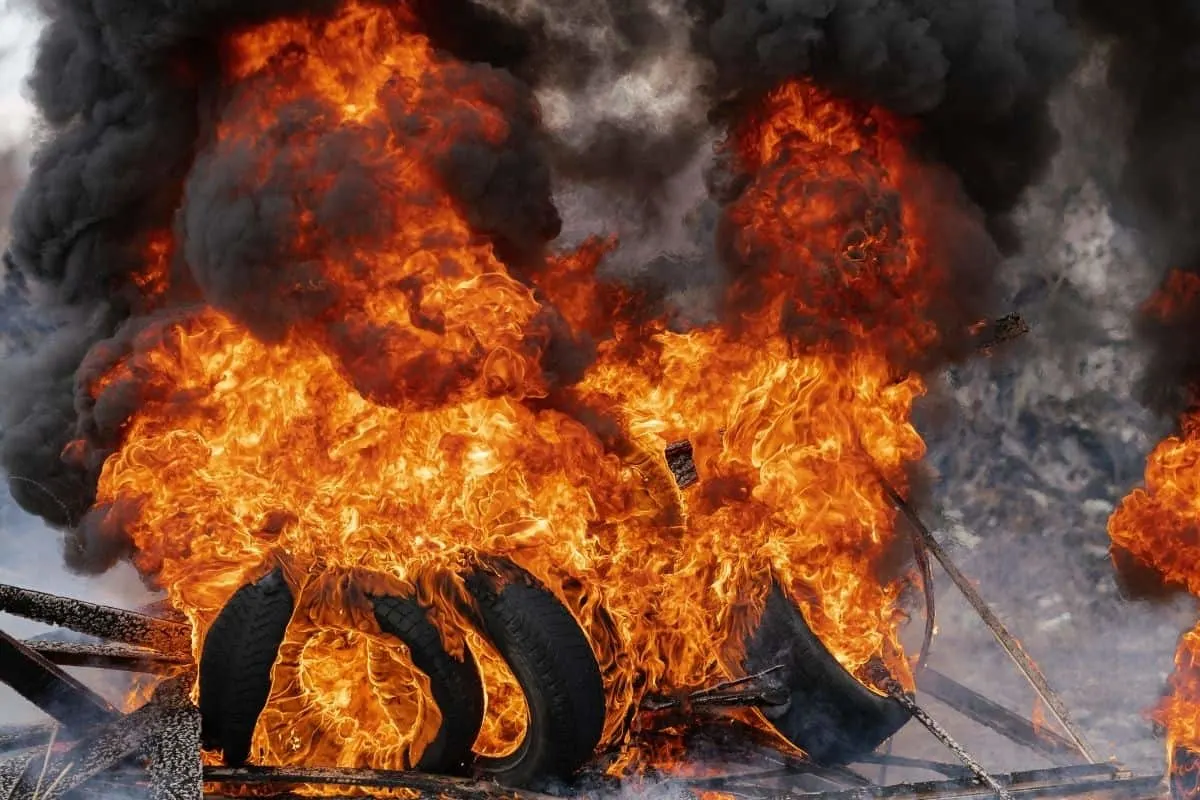It is a common belief that your car tires could catch fire while you are driving down the road on a hot day. You might be wondering If there is anything behind this, and if you have to worry about your car tires. Let’s explore some of the myths and facts behind this belief!
Car tires can catch on fire but it takes extremely high temperatures as vulcanized rubber has an ignition point of around 774 degrees Fahrenheit. Tires are also treated with fire retardant coatings to further decrease the likelihood of catching fire.
Although it’s possible for car tires to catch on fire, it’s not common under normal driving conditions. Keep reading to learn how and when tire fires can occur.
Are Car Tires Flammable?
First, let’s explore the question of whether car tires are flammable.
The answer is yes, they are flammable, and tire fires have been some of the worst fires in history. These types of fires usually occur in landfills or where there are large volumes of tires stored.
Some tires are destroyed by incineration and are used as fuel for electrical generation. They can be used as a substitute for coal or wood. Before they are burned, they are usually chopped into small pieces or pulverized for efficient burning.
Regarding how hot tires need to get to catch fire, you have to consider several different factors. The ignition point is the point where the tire will spontaneously combust without any assistance from accelerants or another fuel source.
Rubber in its natural state has an ignition temperature of 628 degrees Fahrenheit.
When tires are made, the rubber is mixed with sulfur, carbon, and other compounds in a process called vulcanization. The presence of these other compounds can affect the ignition point of the finished tire.
Rubber and nitrile butadiene that has been vulcanized has an ignition point of around 774 degrees, but the presence of other additives can affect this.
Also, tires are often treated with a fire retardant which helps to prevent them from catching fire under normal circumstances.

Can Tires Catch on Fire While Driving?
A fire must have three things to ignite and continue burning. It must have fuel, a sufficient heat source to heat it past the ignition temperature, and oxygen. If you deprive the fire of any one of these things, the tire cannot catch fire or continue to burn.
When it comes to tire fires, the tire itself is the fuel. Most average tires must reach a temperature of 750 to 1000 degrees Fahrenheit (450-500 degrees Celsius) before they are at risk of catching fire. Typically, this temperature must be sustained for at least several minutes before the tire will catch on fire.
When a tire catches on fire, the first thing to ignite is usually not the rubber itself. As the rubber begins to reach the ignition point, it releases a cloud of flammable gases, and these are usually the first thing to catch. Once these fumes catch, then the tire itself can follow.
The answer to the question of could a tire catch fire on your car is yes if all three of these conditions are met. The question then becomes what could cause the tire to become so hot that it reaches the ignition temperature.
It is not uncommon for race car tires to operate at temperatures as high as 350 degrees Fahrenheit, but they are also made to withstand these temperatures. It’s worth pointing that although this would be very hot to touch, it’s still well below the temperature where fire would be a concern.
The average street car tire is exposed to very little friction as long as everything is kept in proper repair, and they are inflated to the proper poundage.
Can a Blown Tire Start a Fire?
Trailer fires on semi-trucks do occur occasionally. Tire fires are also more common on aircraft and industrial machinery. These circumstances involve large tires and hotter heat sources.
The heat of friction can heat the tire enough to cause it to catch on fire going down the road. Improper tire inflation causes more friction than keeping your tires at the proper pounds per square inch (PSI).
Several films clearly show how the tire on a tractor-trailer catches fire.
Heat builds up when the tire is underinflated. When the tire heats to 300 degrees Fahrenheit, the tire begins coming apart. At between 500 and 550 degrees flammable vapors are released.
When the tire reaches between 650 and 700 degrees Fahrenheit, the tire can catch on fire if an ignition source is nearby. Several videos for research purposes show that the sparks generated by the wheel dragging on the pavement were enough to cause ignition.
The same thing can happen to a standard automobile if the conditions are right, but it usually takes a combination of two or three things to cause this to happen.
Most Common Causes of Tire Fires
Aside from underinflated tires, it is possible for an axle bearing to freeze on a tractor-trailer, which can heat the axle to between 800 and 900 degrees Fahrenheit.
At this point, the tire can spontaneously combust without an outside ignition source. Modern trailers now have sensors on the tires that will send an alert to the driver if one of the tires is beginning to produce too much heat.
Fires on passenger cars going down the road are rare. It is typically not associated with a hot summer day, but rather a maintenance issue that causes excessive friction to build up.
There are several things that you can do to help make sure your tires are in good condition and reduce the risk of a tire fire.
1. Keep Your Tires Inflated Properly
It has already been mentioned that you should regularly inspect your tires to make sure they are properly inflated.
Even if the tire does not get hot enough to catch on fire, it can get hot enough to cause the rubber to soften and weaken. This can cause the potential for a blowout or accident.
2. Check for Fluid Leaks
You should also check to make sure that there are no fluid leaks around the area of your tires.
Brake and joint fluids can be highly flammable at lower temperatures. If they catch on fire, the tires could catch, too.
3. Keep Your Brakes in Good Repair
If you happen to have brake shoes that are worn, a caliper that is sticking, or any other problem with your brakes or axles, it could get hot enough to catch your tire on fire.
Under normal circumstances, brakes will not reach 350 degrees Fahrenheit, but if there is something wrong, metal on metal friction can cause them to reach over 1,000 degrees Fahrenheit.
This is enough to cause your tires to release gases and catch on fire.
What To Do If Your Car Tire Catches Fire?
If you do happen to see a cloud of black billowing smoke coming from around your tires, it is best to stop the car and shut it off. Even if you have a fire extinguisher, this is one fire you should not try to put out yourself.
The black smoke contains many toxic chemicals including cyanide, carbon monoxide, and sulfur dioxide, which can be deadly in small amounts.
The best thing to do is to get as far away from the vehicle as possible, preferably not downwind, and call emergency services.
Tire fires, once ignited, are difficult to put out, and they often reignite several times before being fully extinguished. They are not something to mess with yourself.
Proper maintenance is the best way to prevent the possibility of your car tires catching on fire. Although it is extremely rare, it does happen from time to time. Your tires are one maintenance item that you should not neglect!
